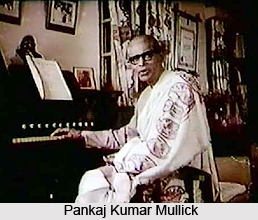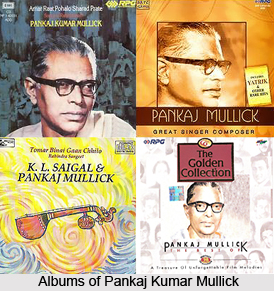 Pankaj Mullick was born on 10th May in the year 1905 to father Shri. Monimohan Mullick and mother Smt. Monomohini Mullick. He was initiated to Rabindra Sangeet under Shri Dinendranath Tagore, Rabindranath Tagore`s grandnephew. At a very young age he has learnt the nuances of khayal, dhrupad, tappa and also other forms of classical music under expert tutelage of Shri. Durgadas Bandopadhyay.
Pankaj Mullick was born on 10th May in the year 1905 to father Shri. Monimohan Mullick and mother Smt. Monomohini Mullick. He was initiated to Rabindra Sangeet under Shri Dinendranath Tagore, Rabindranath Tagore`s grandnephew. At a very young age he has learnt the nuances of khayal, dhrupad, tappa and also other forms of classical music under expert tutelage of Shri. Durgadas Bandopadhyay.
Early life of Pankaj Mullick
In the year 1927, he joined All India Radio (AIR) then known as the Indian Broadcasting Company. On his first day at the radio station Pankaj Mullick executed the famous songs "Emono dine tare bola jay" And "Ekoda tumi priye" live on- air. Later on he started conducting a show namely `Sangeet Shikshar Ashar`. The show reached the soaring popularity all over the country. The most prominent part of the show is that, Pankaj Mullick through the show started encouraging women from conservative and estimable families to learn singing. Earlier that was wrapped with social taboo. This programme also acted as the terminal point that `broke the language-barrier as people from all across the nation as well as from abroad tuned-in to hear him sing and teach`.
Pankaj Mullick`s Rise to Fame through AIR
Thus apart from being an accomplished singer of Rabinhdra Sangeet this programme of radio earned him the identity of a great trainer. For over four decades from 1929 to 1975 he conducted these classes. With his attempt this kind of platform became teaching ground of songs not only Rabindra sangeet but also written by celebrated executor Rajanikanta Sen, Atulprosad, and Dwijendralal. He also started teaching Nazrulgeeti, Padakirtan, Folk songs, Patriotic songs, Shyama Sangeet, songs by Vidyapati Thakur, Banikumar, Ajoy Bhattacharya, Sailen Roy, Gopal Krishna Mukhopadhyay, Hindi Bhajans by Tulsidas, Surdas, Mirabai and others. He has also taught a lot of Vedic hymns, Stotras from Upanishads and Sanskrit songs in the programme.
Another notable juncture of Pankaj Mullick was the creation of Mahishasura Mardini. The idea of Banikumar, Birendra Krishna Bhadra and Pankaj Mullick a programme was born that became `an inseparable part of Bengali culture`. In the year 1932, this programme started and today it is aired every year at day-break on Mahalaya. At the initial stage this programme was aired live every year, new singers were also introduced into the programme on a regular basis. To keep the programme bracing and vibrant within a `preset framework`, several innovations took place regularly.
Pankaj Mullick as a Musician
Pankaj Mullick has also composed music to his credit for several eminent singers. Krishna Ghosh, Abhabati, Manikmala, Prafullabala, Beenapani, Prabhabati, Angurbala, Ila Ghosh, Ila Bose, Shailadebi, Suprabha Ghosh, Supriti Ghosh, Shipra Basu, Ashima Mukherjee, Krishna Dasgupta, Aroti Mukhopadhyay, Sumitra Sen, Sandhya Mukhopadhyay, Pratima Bandopadhyay, Utpala Sen, Hemanta Mukhopadhyay, Rabin Bandopadhyay, Pannalal Bhattacharya, Dwijen Mukhopadhyay, Manabendra Mukhopadhyay, Sachin Gupta, Shyamal Mitra, Bimalbhushan and Tarun Bandopadhyay are some of them who has sung in his tune.
Pankaj Mullick`s Career In Movies
From the silent era Pankaj Mullick was related with the world of movies. He started his career in movies around the late 1920`s and early 1930`s as a music director. At that time he was comporting live orchestras for silent-movies such as Chorkanta and Chashar Meye for the company International Film Craft.
 For the first talkie-movie Dena Paona Pankaj Mullick scored the music in accompaniment with Sri. Rai Chand Boral. In the year 1937, with the movie Mukti directed by illustrious actor cum film director Pramathesh Chandra Barua, Pankaj Mullick has been re-introduced as an independent music-director. To him it was undoubtedly a landmark for him as he not only scored the music but also sang and acted in it. Eventually the film has always been memorized as the first movie in which Rabindranath Tagore`s songs were used in an effective manner.
For the first talkie-movie Dena Paona Pankaj Mullick scored the music in accompaniment with Sri. Rai Chand Boral. In the year 1937, with the movie Mukti directed by illustrious actor cum film director Pramathesh Chandra Barua, Pankaj Mullick has been re-introduced as an independent music-director. To him it was undoubtedly a landmark for him as he not only scored the music but also sang and acted in it. Eventually the film has always been memorized as the first movie in which Rabindranath Tagore`s songs were used in an effective manner.
Over a hundred movies, in both Hindi and Bengali he playacted, scored music for and sang. Some of these were: Desher Mati (1938), Bhagyachakra, Boro Didi & Jeevan Maran (1939), Nartaki (1941), Meenakshi (1942), Daktar (1943), Kashinath, Dikshul (1943), Dui Purush (1945), Nurse Didi & Ramer Sumati (1947), Pratibad (1948) Rupkatha (1950), Mahaprashthaner Pathey (1952), Banahansi & Nabin Yatra (1953), Raikamal and Chitrangada (1955), Louhakapat (1958), Awbhaan (1961). `Janhabi Jamuna Bigolito Karuna` was the last movie by him as music director that was released during 1968 - 69. Pankaj Mullick khas also worked under the big banners like New Theatres, Bombay Talkies and Aurora Films in their films namely, Yahudi ki ladki (1933), Dhoop Chhayon, Manzil, Millionaire, President, Zindagi, Dhartimata, Dushman, Meri Bahen, Dharti ke lal, Yatrik and Zalzala. Mukti, Daktar, Alo Chhaya, Kapalkundala, Aandhi, Dhartimata, Deshermati and Adhikar are also the movies where he has playacted.
Pankaj Mullick has however fetched the honor of releasing the first movie featuring playback singing that was brought out to the world of Indian Films under the direction of Nitin Bose.
Awards for Pankaj Mullick
Acknowledging his talent he has been conferred many accolades. Some of them are, Title of Surosagar in the year 1931, title of Sangeet Ratnakar in the year 1962; title of Padmashree in the year 1970; Dadasaheb Phalke Puraskar (the highest form of award presented by the Government of India to a person for pioneering activity in the field of Indian movies) in the year 1973; Title of Rabindra Tattyacharya in the year 1977 from Tagore Research Institute; the BFJA (Bengal Film Journalists` Association) Award and Rashtrapati Puraskar for composing the best film music of the year for the films Yatrik and Raikamal; commemorative awards from AIR on its Silver and Golden jubilees; posthumously the Government of West Bengal named the former Ritchie Road as Pankaj Mullick Sarani in his honour.
Pankaj Mullick In Later Phase of His Life
Some achievable works done by him are, in the field of taking Rabindra Sangeet beyond the boundaries of Shantiniketan has been his pioneering work; promotion of Rabindra Sangeet amongst the general population; introduction of the tabla and several other instruments in Rabindra Sangeet. With due permission of Rabindranath Tagore himself he has attempted to set tunes to Tagore`s poems, Shesh Kheya into Diner Sheshey, during Tagore`s lifetime. He is reckoned to be the father of the genre of modern Bengali songs prevalently known as Adhunik Gaan. In the field of playback singing, he also did some exploring work. Pankaj Mullick has also bagged the honor of introducing prelude, interlude and inter-linking music in Indian film songs. He is the first one to introduce the four-part song in Indian film music. In the Indian Film Industry, Pankaj Mullick played a pioneering contribution in introducing western instruments.
Pankaj Mullick passed away on 19th February in the year 1978. After his death, to take part in his funeral procession thousands of people poured out onto the roads of Kolkata. The funeral procession was ended at the Kewratola crematorium. Many respective people sent in their condolence messages. From various walks of life a host of other important people too sent in their messages. Satyajit Ray said, `Pankaj Mullick earned legendary fame and popularity as a singer and teacher of Rabindra Sangeet. He devoted his whole life to this cause`.